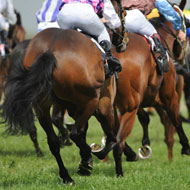
Strict anti-doping policy protects horse welfare
The President of the FEI has sent a strong message to the equestrian world on the importance of the FEI Clean Sport Campaign.
In a statement, President Ingmar De Vos said: “It is vital for the integrity of all sport that it is clean and fair, but it is even more important when there is an animal involved because of the welfare implications.
“The FEI has a stringent anti-doping policy in place to protect horse welfare and maintain a level playing field. Horse welfare and fair play have always been and always will be two of the central pillars of the FEI.
“We have close to 4,000 international events on the FEI calendar now, and as the international governing body, it is our responsibility to safeguard our athletes and the sport itself, and part of that is protecting our clean athletes. We have a rigorous testing policy and the FEI Prohibited Substances List contains over 1,000 substances, so it is crucial that our athletes and their vets are aware of what they are giving their horses.
“Of course our horses have to be treated if they are injured or sick, but anything given to the horse must have been eliminated from the body of the horse by the time of competition so that we can maintain the integrity of our sport.
“Boosting awareness and education is key. Keep it clean is the message.”
The statement follows news that the FEI has imposed provisional suspensions on two athletes whose horses have tested positive for prohibited substances.
Samples taken from the horse Buenaventura ridden by Candice Pilloni returned positive for the banned substance Oxycodone, and the Controlled Medication substance Lidocaine and its metabolite 3-Hydroxylidocaine, a local anaesthetic.
Samples taken from the horse Why Not, ridden by Sophie Simpson (USA) in Jumping, returned positive for the banned substance Capsaicin, a topical analgesic or irritant.
Both athletes have been provisionally suspended from the day of notification (31 August) and the two horses have been provisionally suspended for two months.



 The RCVS has announced a new version of its 1CPD mobile app, with enhanced features for veterinary surgeons and veterinary nurses to record their continuing professional development.
The RCVS has announced a new version of its 1CPD mobile app, with enhanced features for veterinary surgeons and veterinary nurses to record their continuing professional development.